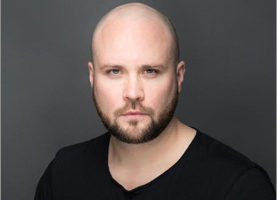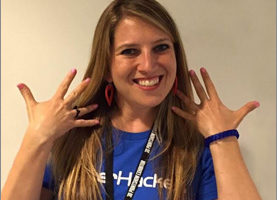In this important podcast, Alan K. Davis, PhD, of Johns Hopkins University’s Center for Psychedelic and Consciousness Research, talks about his clinical research studying the effects of psilocybin for those who suffer from depression.
Dr. Davis provides a thorough overview of his research. He is a guide for psychedelic- assisted psychotherapy for those who suffer from depression. The Johns Hopkins University researcher’s work is centered on psychedelic research—clinical trials with psilocybin for people who have depression. Dr. Davis explains how psilocybin can potentially improve mental health. And progress seems to be happening, for as many as 50% of their study’s participants experienced a complete eradication of their depression after just one month of treatment. Dr. Davis states that a “good number” of those people are still free of their depression symptoms at the three and six month marks, so researchers are hopeful.
Dr. Davis provides an outline of how their treatment process works and why psychotherapy is an important part. He discusses upcoming trials and the necessary data that the FDA will require before they will approve psilocybin as a drug that can be prescribed by psychiatrists. Dr. Davis discusses legislative changes, and the DEA’s role.
The research doctor discusses the pathways that allow psilocybin to act. He explains how psilocybin takes action on an important neurotransmitter in the brain—serotonin. Dr. Davis explains how serotonin regulates mood, appetite, and sleep, and why psilocybin is perhaps a good option for depression, as it seems to help stabilize the aforementioned in
study participants.
Richard Jacobs: Hello, this is Richard Jacobs with the future tech and future tech health podcast. I have an assistant professor, Alan Davis at Johns Hopkins. We are going to be talking about exploring the acute and then the persistent effects of psychoactive substances? Well, Alan thanks for coming. How are you doing?
Alan K. Davis: Thanks. I’m good. Thank you. Thanks for having me.
Richard Jacobs: Can you tell me a little bit about your research? What are you working on?
Alan K. Davis: Sure. Yes. So I have worked for the past few years at Johns Hopkins and our newly titled center for psychedelic and consciousness research. I’m a clinical psychologist, so I both works as a guide of psychedelic-assisted psychotherapy for people with depression as well as a researcher. So I do publishing and other types of studies there.
Richard Jacobs: Okay. So is it primarily people with depression and using psychoactive substances to get them over a chronic depression or how do you encapsulate it? What are you working on?
Alan K. Davis: So we use primarily psilocybin, which is the active ingredient, the active psychedelic ingredient in magic mushrooms. We use that as an adjunct to therapy for people with depression and addiction. And coming up here in the next two years, we’re going to be looking at that as a treatment for people with PTSD and anorexia. But the program that we have engaged with there at Hopkins is, has been around for about 20 years. We started looking at the use of psilocybin in healthy volunteers just to get a better sense of its acute effects and its safety. And then eventually we were able to start applying that to clinical populations to see if it was helpful with depression and addiction.
Richard Jacobs: So is there any you know, whether they appear viewed or not or double-blind studies. I mean, so far what does it look like? Does the psilocybin affect people significantly that have depression and how?
Alan K. Davis: Yes, so all of our studies are peer-reviewed clinical trials and have been approved through IRB and FDA and DEA. And our most recent trial with depression is just wrapping up. And so we haven’t published those findings quite yet, but the results are showing that after the treatment is complete, about half of the people in this study no longer have depression. Their depression is completely gone at one month after the treatment. And we’re following up with them is as far as 12 months out to see if that lasts. And so far the three in six months’ time points, we are seeing that a good number of those people still are without depression.
Richard Jacobs: So what is the treatment? Is that one dose of psilocybin or is it multiple? Like what does the treatment look like?
Alan K. Davis: So we give two doses of psilocybin on two separate days. Those days are full days in the clinic with either myself or one of our other primary guides as well as a co-guide. And then we also have about eight hours of therapy before the experience to help prepare them for psilocybin as well as therapy in between sessions and after the second psilocybin session. So in total, it’s about 12 to 14 hours of psychotherapy plus the two days of psilocybin.
Richard Jacobs: Well, what’s involved in the psychotherapy? Why the preparation? What do you have to do?
Alan K. Davis: So the reason that we have so much preparation is that we’re giving a moderate and high dose of psilocybin. These are doses that are usually much larger than what people would have in, for example, a festival environment or even at home. Necessarily some people seek out high dose psilocybin experiences on their own, but we’re giving pretty high doses. So we want to make sure in that therapy that we are doing what we can to build a solid connection with the person that they feel like they can trust us and trust the environment and that we have a pretty good sense of the kinds of things that might come up on their session days so that when they come in for their first psilocybin session, they are as prepared and ready and as trusting as possible. Because there are a lot of things that can come up that day, especially with people who have mental health problems. And we want to make sure that everyone’s prepared for that.
Richard Jacobs: Yeah, that makes sense. So when you say depression, what kind of depression did the study participants have? Like what were the requirements?
Alan K. Davis: For this study, everyone had to have at least a moderate or severe depression. And most of them had had depression for about two decades. Almost all of them had used several other types of treatment without much effect. They had tried medications, they had tried psychotherapy and they had not found relief from their depression and had been living with that for a very long time. So most of these folks would be considered as treatment-resistant, meaning that they just didn’t have a positive effect of what we already have available for treatments coming into our study.
Richard Jacobs: Okay. And do you look at what experiences they had during the first and second sessions and was that different? Can you get anything on anecdotes that people gave back during or after these sessions?
Alan K. Davis: So some of the things that we know about what makes these experiences therapeutic for people are things related to mystical experience or an experience where people feel as though they are more connected to the universe, more connected to other people, more connected to themselves, and they develop that connection. They have that experience of connection during the psilocybin experience. They also report having experiences of gaining insight, which can be a new awareness or discovery about some new information that they previously weren’t aware of that can take the form of new information or awareness about their jobs or their relationships or past difficult emotional experiences that they’ve had. And it’s the combination of these mystical and insightful experiences that seems to be related to the effects that we’re seeing. We also did for the depression study, a neuroimaging before and after the treatment in order to get a sense of whether or not there were actual changes in the brain activation and whether or not that related to the outcome. What we found is that there were significant changes after the treatment and this area of the brain that’s responsible for processing emotion and then that change, that improvement of their ability to process that emotion actually related to their decrease in depression. So we’re seeing both acute self-report experiences that seem to be helpful as well as changes in brain function seems to be helpful.
Richard Jacobs: And what about the difference between the two sessions? Was there a big difference? Like why two sessions and what happened? Answer one versus answer number two.
Alan K. Davis: So I would say that the two sessions are differed by dose. So in the first session, we use this slightly a little bit two thirds the size of the dose that we use in what we call the high dose second session. And one of the reasons that we do that start off with a smaller dose is that we want people to get some experience and to kind of dive in, but not give them the full big dose in the first session in case there are any challenges. Essentially it’s kind of starting off with a little bit of practice, a little bit of getting comfortable. Not to say that people don’t have meaningful experiences in that session. They do, it’s not a small dose. But in part, it’s to kind of grease the wheels for the higher dose session. We don’t see a lot of differences in terms of the effect it seems to be the two sessions together. These sessions also occur pretty quickly. In terms of how far apart they are, they’re usually only about two weeks apart. And so some people do start feeling better after the first session, but we see a bigger effect after the second session.
Richard Jacobs: Okay, makes sense. Again, some people you said to get insights, what kind of insights are they getting? Can you characterize it at all?
Alan K. Davis: I’ll give you an example. We had someone recently who was really struggling with social anxiety in addition to depression. So they were really struggling to work and to feel like they could go to work and be successful in fact, they would get to work in their social anxiety and depression will be so intense that they would end up calling out sick and having a lot of difficult problems succeeding in that environment. And during this person’s psilocybin session, they had this experience of becoming a large dragon. And in this kind of visual adventure, they flew in as a dragon to their work environment and proceeded to eat every single person in their job and then burn it all to the ground. And this person came out of that experience feeling empowered. And when they went back to work, they came in and said to us, I have zero anxiety anymore at work because how can you be afraid of people you can eat?
Richard Jacobs: That’s pretty cool.
Alan K. Davis: Yeah. So that’s those kinds of like powerful visual experiences coupled with these insights, these new understandings of themselves that seem to produce change.
Richard Jacobs: Yeah, that’s excellent. How would this manifest in a, you know, an approved medicine for people, you think you won’t be the native mushroom itself? They would be approved or that’ll be a medicine that isolated certain parts of the psilocybin? What’s your vision for the future?
Alan K. Davis: So the vision for the future is that hopefully in the next few years, FTA will have enough evidence to be able to determine whether or not it should be made available to the public for the treatment of depression. We’re going into this fall starting the last multi-site trials, which means that it’s going to be at Hopkins as well as I think seven or eight other sites around the country. And this multi-site, large numbers of people coming into this study is the type of data that FDA needs as a final step to make sure that it’s something that can be approved. Once it’s approved, it will be approved as a synthetic drug. So it won’t be the mushrooms. It’ll be a synthetic capsule if you will, of the psilocybin and it will likely be administered in specialty clinics around the country that are specifically trained and accredited for this type of treatment. So it will probably be somewhat different than the types of medical settings that currently exist.
Richard Jacobs: Oh, so you don’t think it’ll just be some psilocybin ground up, but into like a pill format and adjusted?
Alan K. Davis: It’s unlikely that in terms of the medical use of this, it will almost certainly have to be a synthetic drug that’s maintained and controlled in terms of the dosing and the purity. Now that doesn’t mean that there aren’t other efforts, certainly there are efforts in Colorado and California and other places too, to criminalize mushrooms and to work towards the finding the availability for the general public, not necessarily looking for a clinical experience, but just wanting to experience mushrooms on their own in a legal environment. And certainly those efforts will probably continue and maybe available at some point in the future as well. But in terms of medical use we’re talking about kind of a prescription that’ll have to be prescribed by a physician or a psychiatrist and administered by a psychologist, social workers and counselors.
Richard Jacobs: Which scenario do you think is more likely or do you think both will happen?
Alan K. Davis: Well if we look at the marijuana movement across the country, even with all of the States that have already approved the recreational and medical use of cannabis the federal government still has not really made much progress in doing anything at the national level. So I doubt that there will be anything different in terms of the use of psychedelics in recreational settings. I think that what’s more likely to happen is that the FDA will have enough evidence to hopefully approve it as medicine first. And when that happens, then the DEA is going to have to decide whether to reschedule it because as it’s currently scheduled, it would not be able to be prescribed. So they hopefully will be rescheduled into a less restrictive schedule, which would hopefully pave the way for other types of efforts to decriminalize and to move that effort forward as well.
Richard Jacobs: So first step is maybe to move into a less, what would you call it? I guess, how would you describe it? You reschedule it.
Alan K. Davis: Exactly, to put it in a lower-tier where it’s less restrictive and usually that’s associated with like fewer penalties for people using it and having it. Hopefully in general, the more evidence that we publish that shows that it’s safe that people have safe experiences in the right types of settings with the right type of preparation. And that people can actually, we see a benefit with that. The less argument that the government can make that it’s actually dangerous.
Richard Jacobs: Hmm. That’s true. So in order, what do you think there’s likely to happen?
Alan K. Davis: Well, I think the best sense of it is that right now there’s really no predicting what the federal government’s going to do at any given moment. So I think that luckily we have a couple more years and maybe, hopefully, that means a couple, changes in some of the composition of our federal government and the people that are in those agencies. What we do know is that the FDA is already supportive of this effort. The people at FDA have invited us out several times to talk about how best to see this work forward. They’ve actually designated psilocybin as a breakthrough therapy treatment for treatment-resistant depression. And basically what that means is that the FDA thinks that the current evidence so far is so compelling that they actually want to make sure that they’re doing everything they can to see this through the process as quickly as possible. And so FDA seems to be pretty much behind the effort. But again, they will need this last bit of data before that can make the final decision.
Richard Jacobs: So what’s the timeline on this?
Alan K. Davis: I think best guess that I have would be, we’re probably two to three years away from having this data from the big multisite trials and that’s when FDA will at some point after that, be presented with that data and then make a determination. So I would say we’re at least probably two to three years away as a conservative estimate. And it could be longer than that, just depending on the timeline. One of the challenges with this kind of work is funding and having the resources and frankly getting people to volunteer, it still is an experimental treatment. There’s a lot of people that are concerned about the fact that it’s still experimental. And so trying to get people into this study is still something that we have to do.
Richard Jacobs: How many more people need to get into the studies you’re running? Like how much more of this portion of the work needs to be done? Or is it pretty clear that the psilocybin’s having a major effect positively?
Alan K. Davis: So the first step of this multisite trial that’s getting started here this month actually is going to enroll 56 people across seven sites. Now to get to that 56 people, we’ll probably be going to have to screen and go through kind of an assessment process for maybe upwards of a thousand or more, maybe even 1500 people in order to get to that number. And then there’ll have to be a second multisite trial that we’ll have to probably screen many thousands of people to get several hundred people that have gone through the study. So it’s definitely a long road over the next couple of years. But luckily there’s a group of people in Wisconsin who are managing the multisite trial across all the sites and their backing through financial efforts as well as clinical oversight to help make sure that this moves through the process as quickly as possible.
Richard Jacobs: Interesting. Any other substances that you’re going to be testing or only psilocybin? Or is there variation in psilocybin certain times are fundamentally different from one another. They work better or don’t work as well.
Alan K. Davis: So there’s only one type of synthetic psilocybin and that’s what we primarily use for these studies. Although there are efforts looking at MDMA as an adjunct to therapy for PTSD. And actually those studies are a little bit further along so they are already in well on their way to finishing their multisite trials to determine whether that can be approved. And FDA has also given that breakthrough therapy status. So it’s actually more likely that the FDA might approve MDMA for the treatment of PTSD before we have the evidence for psilocybin. And if that happens, if that does get approved, that actually might open the door and will pave the way for several making it a little bit easier for psilocybin. Especially depending on what the DEA decides to do, If FDA makes it available.
Richard Jacobs: What about the mechanism by which it acts? Any insight into that.
Alan K. Davis: So with psilocybin, we know that it has acted on this neurotransmitter in the brain called serotonin. And serotonin is really important because that’s the chemical in the brain that regulates things like mood and appetite and sleep. And what we know about depression is that those are some of the main areas that are affected. So obviously negative mood decreased or increased appetite and a lot of sleep disruption. And so it doesn’t seem to be a logical conclusion that because of psilocybin effects that neurochemical that we’re seeing some of the positive effects. But what we also know is that psilocybin has effects on lots of different parts of the brain that might also be responsible. And in fact, the reason why it may be better than other traditional medications is that it doesn’t just affect the serotonin system, it affects other systems. And it comes along with like I mentioned about 12 to 14 hours of psychotherapy. What we know about regular treatments for depression is that usually, it’s the combination of therapy and medication that has the best out likelihood of a positive outcome. And so that’s certainly a piece of the puzzle with this treatment as well.
Richard Jacobs: So you’re using a synthetic form of this psilocybin, you’re not using the native mushroom itself ground up.
Alan K. Davis: Correct. That’s true. We are using a chemical that was made in a laboratory.
Richard Jacobs: But why? Because people think it may or you think maybe to compound the study, have you used just found in mushrooms or is there another reason?
Alan K. Davis: Well, as you might imagine, the FDA doesn’t produce medications that are a plant. And so the medications have to be tightly controlled. They have to be dosed, we have to understand specific dosing and purity about that specific molecule and compound. And the only way to do that reliably and across different people in different studies and different locations is to use a synthetic drug.
Richard Jacobs: Okay. I was just wondering why. That’s interesting. So yeah, I’m not sure. I guess quite what else to ask about. Are there certain forms of depression that you’ve encountered where the person has different effects, I mean negative effects or effects that are just different or unusual than the clearance of the depression?
Alan K. Davis: One thing I’ll say is that we the team, but I also don’t believe that this is a magic bullet. This is not going to solve depression for every person. And we’ve seen that even in our studies, even though so many people are getting better, there are some people who don’t get better. And we think that one of those reasons is how long they’ve been living with depression. So some of our folks in the study have had depression for 40 or 50 years and they’ve been on lots of standard treatments, lots of standard medications. And even though we think this treatment is pretty powerful, it might be the case that only two doses are not enough to help people like that. And so some of our people who are in that group have not had a strong of a treatment effect. So it might be that someday when this is in clinical practice that people might need four or five sessions over the course of a year before they really get the full effect, especially if they’ve been dealing with depression for a very long time.
Richard Jacobs: What about other conditions? Maybe brain-related, maybe this is way too far-field, but dementia or Alzheimer’s, things like that. Or is it plenty enough to stick with just depression and even like schizophrenia is too far afield?
Alan K. Davis: So in the next couple of years, we’re starting five new clinical trials at the center at Hopkins and one of them is going to be for Alzheimer’s patients. We have another one for Lyme disease patients, another one for people with anorexia and also PTSD. And these studies are all getting started because of the funding that we’ve received to open up this center. And we think that psilocybin treatment might have what we call a transdiagnostic effect across conditions, meaning that most of our treatments are treating the symptoms of these problems, but they don’t actually get to the underlining reasons and causes for why people have these problems, to begin with. And it’s possible that psilocybin therapy actually gets to this deeper level of what’s creating these types of problems. And if that’s true, if we keep seeing these positive effects across different types of conditions and different types of studies than it might provide more evidence to confirm that hypothesis.
Richard Jacobs: So I guess maybe one of the nice things is that as long as this works understanding the mechanism by which it works is not necessarily right for approval by FDA?
Alan K. Davis: It’s not necessary for approval by FDA, but it is a question that is a big part of the types of studies that we’re designing. So that’s one of the reasons why we do the neuroimaging. It’s one of the reasons why we do a lot of questionnaires is because we’re trying to do our best to understand that mechanism, but to fully do that, we would need a lot more money and a lot more resources to get all of those questions,
Richard Jacobs: Oh, have you done neural imaging on these patients and if so, what have you seen?
Alan K. Davis: Yes. So for the depression trial that we’re just wrapping up. In 24 patients we gave them an FMRI neuroimaging before this session, their first session. And we also gave it to them after their second session. So really look at pre, post. Are there any differences in brain functioning before psilocybin to after? The region that we were primarily interested in was the amygdala and the amygdala is the part of the brain that responds to emotional cues in the environment. So for example, with depression, we know that the amygdala is more likely to respond to negative emotions that people come into contact with and to kind of per separate on those emotions. So people are more likely to see negative things and to focus on those negative things as opposed to positive things. And that not only kind of maintains depression because people are only seeing and really reacting to negative things in their environment. But it can also potentially be a reason why they got depressed to begin with. And so what’s interesting is that in this part of the brain, what we saw with this treatment is that their response to that negative emotional cues in the amygdala decreased after treatment, which means that the amygdala, this region of the brain was less likely to pick up on those negative views as it was pretreatment, which points to as a pretty strong indicator of one of the potential mechanisms of this treatment.
Richard Jacobs: Oh, did you see any changes in the morphology or the size of the amygdala or the blood flow or the chemistry of it somehow if you’re able to look that way?
Alan K. Davis: So that goes a little bit outside of my expertise. We do have a neuroscientist on the team who has been looking at those deeper fine-grain details, but I don’t have that information yet.
Richard Jacobs: Okay. So if you’re looking at FMRI is that obvious, have you been able to look at the FMRI or again is that not your area?
Alan K. Davis: Well, I’ve been able to look at the data which is kind of comes out and you know, numbers and sequences and then we use that data to correlate it to other data. But the actual images of the brain, at least to me is kind of the on the research or on the data analysis end is not something that I’ve looked at.
Richard Jacobs: Okay, good. Very good. So how can people follow along with what you’re doing, all the clinical trials and get more info and maybe even try to be a part of one of the trials. How can they take the next step?
Alan K. Davis: So we have a website, hopkinspsychedelic.org and people can sign up for our newsletter and in that newsletter, we will post things like new studies that are coming up, ways to participate if people are interested in screening for a study. We’ll also be hiring for quite a few jobs in this new center and we’ll post a lot of those updates via that newsletter so people can learn more at hopkinspsychedelic.org.
Richard Jacobs: Okay, excellent. Well, thank you so much for coming on the podcast and its super important work you guys are doing. It’s going to help a lot of people, hopefully. So thank you for doing what you do.
Alan K. Davis: Oh, thanks so much for having me. It was a pleasure.
Podcast: Play in new window | Download | Embed











